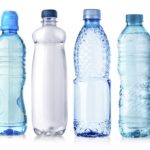Consumer Reports finds arsenic in Starkey Spring Water at higher levels than other brands. Starkey is a bottled water product made by Whole Foods that is sold on Amazon. That's alarming enough, but the level of arsenic in the water is "potentially harmful," according to CR's report. More than a year ago, CR published another list of bottled waters with higher arsenic levels which also included Starkey. Consumer Reports tested dozens of bottled water brands and found that Starkey Spring Water, which was introduced by Whole Foods in 2015, had at least three times the level of arsenic of every other brand they teated. The arsenic levels in that water ranged from 9.49 to 9.56 parts per billion (ppb). That is below the level the federal government sets, which is 10 ppb. But Consumer … [Read more...]
Consumer Reports Finds Arsenic in Bottled Water
Consumer Reports has found arsenic at unsafe levels in some brands of bottled water. The organization is urging the government to recall those brands and to implement better federal standards for this product. Many people around the country rely on bottled water because their tap water doesn't taste good or they don't trust its quality. Unfortunately, bottled water can have issues and be contaminated with unsafe compounds. One of those compounds is arsenic. Arsenic is found everywhere, in the soil, air, and water, and it is found in groundwater, the source for many bottled water brands. The World Health Organization (WHO) says that, when ingested, arsenic can cause arsenic poisoning, skin cancer, developmental problems, memory problems, diabetes, pulmonary disease, and … [Read more...]
USDA’s Food Safety Tips For Severe Weather
The U.S. Department of Agriculture (USDA) has compiled some food safety tips for residents in the South and Midwest affected by severe weather. Here's what you need to know about food safety when sever weather is in the forecast. Before the storm strikes, make sure you have working appliance thermometers in both the refrigerator and the freezer. Safe temperatures for the fridge are 40°F or lower, in the freezer 0°F or lower. Freeze water in one-quart plastic storage bags or other small containers prior to a storm. Tuck them in between frozen foods to help keep them cold. Freeze any food you don't plan to eat in the immediate future such as leftovers, milk, fresh or poultry. This will help to keep them at a safe temperature for a longer period of time. Group food together in the freezer … [Read more...]
Tyler Mountain Bottled Water Recalled for E. coli
Tyler Mountain bottled water is being recalled for E.coli contamination, according to the Pennsylvania Department of Environmental Protection. Customers who purchased 3 gallon, 4 gallon or 5 gallon jugs bottled on April 17, 2014, and April 18, 2014 should not use them. Customers who recently received a delivery are the only ones affected by the recall and can contact Aqua Filter Fresh, which produces the water, at 1-800-864-8957 for further instructions. Aqua Filter Fresh is in the process of replacing all recalled jugs of water. Water that contains E. coli bacteria has been contaminated with human or animal waste. If ingested, E.coli can cause serious illness. Symptoms of an E.coli infection include diarrhea that can be bloody, abdominal cramps, nausea, headaches and other … [Read more...]
Poland Spring Bottled Water Warning in New Hampshire
The New Hampshire Department of Health and Human Services (DHHS) is recommending that anyone who has purchased Poland Spring 3- or 5- gallon water bottles check them for gasoline odors before using. Clean water should not have any type of chemical smell; it is odorless. After Hurricane Sandy, when gasoline shortages were reported in New York, New Jersey, and Connecticut, some people used large water bottles to hold gasoline. Bottled water companies have since detected returned and recycled water bottles with gasoline residue and fumes. The companies have measures in place to remove those bottles from reuse, but a "very small number" of contaminated bottles did make it through the detection process. Those levels of gasoline are "not likely to result in long-term health effects" … [Read more...]








